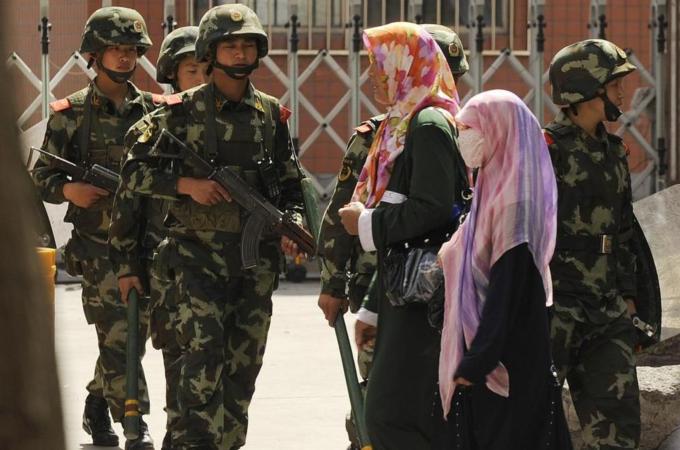In May of last year, Chinese authorities launched a “year-long, ultra-tough, unconventional” crackdown on terrorism in response to an upswing in violent attacks in Xinjiang and elsewhere in China. While official reports at the campaign’s six-month mark trumpeted success with statistics on arrests and smashed “terror gangs,” death tolls suggested that violence in the region may have continued to increase. Xinjiang prosecutors on Friday reported that arrests in the region last year nearly doubled as compared to 2013, and state media announced that the crackdown will be extended until the end of this year. AFP reports:
Prosecutors in the far-western area, home to China’s 10-million-strong Turkic-speaking and mostly Muslim Uighurs, approved the arrest of 27,164 criminal suspects in 2014, up more than 95 per cent on the previous year, the China Daily newspaper said.
“We’ve shortened the time between approving arrests and prosecution in major terrorist-related cases so the suspects can be tried as soon as possible to show the region’s determination to fight terrorism,” Nixiang Yibulayin, ” Xinjiang’s chief prosecutor, was quoted as telling the region’s legislature on Thursday.
[…] The China Daily said the campaign – initiated in May after an attack in the regional capital Urumqi left 39 people dead and 94 injured and originally intended to last a year – had been extended for “at least” six more months. [Source]
In addition to increased security, authorities’ anti-terror efforts have also included restrictions on religious dress and custom; earlier this month, Xinjiang’s capital city of Urumqi approved a ban on the burqa. While the government puts blame for mounting violence on Islamic extremism encouraged from abroad, human rights groups point to repressive regional policies as a major cause of unrest. Last week, Human Rights Watch criticized China’s draft counter-terrorism law for its potential to legitimize and accelerate rights abuses.
Meanwhile, the Party leadership this week approved a blueprint for national security goals. The New York Times’ Chris Buckley reports, putting this into the context of Xi’s tenure:
It was ratified by the Politburo, a council of 25 senior officials, and signaled President Xi Jinping’s latest step to put security at the heart of his agenda. The official announcement of the decision from Xinhua, the state news agency, did not disclose the precise contents of the new document, but it emphasized that China’s leaders saw themselves entering perilous times.
[…] Warnings of looming danger have long been part of Chinese leaders’ political language. But more than his predecessors, Mr. Xi has cast himself as an ardently patriotic defender of unitary national interests, taking a tough stance against neighbors in border disputes and against ethnic discontent in the Xinjiang region and Tibet.
Mr. Xi’s catchphrase is “the China Dream,” and the strategy outline expands on his previous efforts to build up a national security apparatus. He has also pursued an intense campaign to extinguish political dissent, which is seen as menacing to one-party rule, and said that control of the Internet is a mainstay of domestic order. […] [Source]
In a post for The Diplomat, Gabe Collins takes a close look at data on recent Xinjiang attacks, and examines the tactical implications the terror crackdown could have for the Chinese security apparatus:
[…] On a tactical level, Xinjiang’s insurgency does offer China’s public (and private) security apparatus a number of tangible benefits. Xinjiang gives China’s security forces an internal, restricted access “beta lab” in which to test new techniques and technologies (such as drones) before the Chinese military potentially employs them beyond China’s borders.
The continuing conflict in Xinjiang is also creating a core group of police and paramilitary personnel with significant live fire experience in a hostile operational environment. These men (and increasingly, women) offer a prime talent pool for China’s new private security providers as they recruit staff to hire out to Chinese miners and construction firms operating in Africa and other areas where projects may require armed protection.
The growing insurgency in Xinjiang is imposing significant costs on the Chinese government, but the province’s rich mineral resources and strategic geographical position are too valuable to give up, even at the cost of a much bloodier conflict than that which exists today. One looming question is “will Uighur insurgents expand their campaign to include key energy, mining, and other critical infrastructure in Xinjiang?” Such a move is conceivable, but most of these assets lie in open desert and basin and range-type geography that is easily kept under surveillance by unmanned aerial vehicles and other means. […] [Source]
Read more on security and surveillance in China, or on Xinjiang violence, via CDT.








